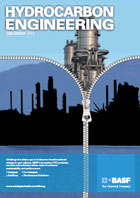Editorial comment
A new phrase has entered my oil and gas lexicon in recent weeks, ‘the resource curse.’ I have been aware of the concept that once the boom of a new finite resource has come to an end, economies suffer, however, the exact terminology is new to me. It was first brought to my attention when I read ‘Oil in Uganda: International Lessons For Success’ from Chatham House and was further highlighted by an article in the Financial Times, ‘Entrepreneurs key to Papua New Guinea avoiding a resource curse’. What both these pieces emphasised is that the resource curse is essentially always a danger and there is no fixed set of rules that will help an economy avoid it.
Register for free »
Get started now for absolutely FREE, no credit card required.
First, let us look at Papua New Guinea (PNG). The island benefitted hugely in the early 2000s with the discovery of vast gold, copper and oil reserves. However, the near completion of the ExxonMobil LNG project is being cited as one of the main reasons why the country is seeing the imminent arrival of the resource curse. The FT has stated that the influx of expats to help construct the project has increased annual GDP to 8% over the last five years, and is likely to drop to 4% in the near future. The arrival of workers has also ‘driven property and food prices to painfully high levels’. As these two fundamental things have reached steep prices and the expat exit is imminent, this doesn’t bode well for the original inhabitants. Also, once construction has finished the number of jobs available will drop from approximately 20 000 to only 600. In a country that has a high level of violent crime and is divided into ‘more than 800 tribes and languages’ these dramatic price increases and the slump in employment opportunities is leaving the nation open to corruption, an increase in economic fluctuations and distortions. With regards to saving PNG from crime, corruption and economic collapse, the FT article hails entrepreneurs as the nation’s saviours. Mahesh Patel is crowned as such due to his development of a pharmacy chain on the island and the opening of the island’s first commercial cinema. His entrepreneurial spirit and endeavours are hopefully going to aid the country by providing employment and help prices stabilise. However, when it comes to Uganda, there appears to be completely different ideas on how to help the country avoid the curse. The Chatham House report states that ‘an oft repeated mantra is that good governance is vital in avoiding the resource curse,’ and from reading the rest of the piece, it appears that this is the approach Uganda is looking to take. The country is relatively new to the oil industry and there is a need for much development and investment before peak production can be achieved, so it is imperative that prevention measures are put in place now. The report comments that Uganda as a whole is attempting to avoid oil undermining governance, and is seeking a universally acceptable way for oil revenues to be allocated fairly. It is the inability to reach a fair and acceptable way that is portrayed as being Uganda’s biggest challenge to overcome and therefore avoid the resource curse. As the report says, ‘the biggest threat that oil poses to Uganda’s harmony would come from allowing rumour and speculation to dominate, notably over how revenues are allocated.’ How this will be achieved and justified is a different story but is one that many hope will be concluded successfully. So, it seems, with reference to the above countries, that while the effect of the resource curse is pretty much universal, preventing it and then overcoming it does not have a one size fits all solution.

